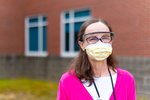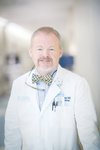


SILER CITY — From the desk in his office at Chatham Hospital, Eric Wolak sees a glimmer of hope when talking about the COVID-19 pandemic.
The recent surge has slowed a bit, vaccinations are on the uptick and the few “breakthrough” cases the hospital has treated have been minor.
But the frustration that Wolak — the hospital’s COO and chief nursing officer — still feels is palpable. You can sense it in the tenor of his voice, his manner, as he talks about the strain the pandemic has put on the hospital’s ability to meet the demand for care.
And then there’s Chatham Hospital’s nursing shortage.
Wolak takes a breath before answering a question about it.
“It’s been very stressful for myself and for our leaders,” he says firmly. “We are doing everything we can to make sure we continue to provide great care here at Chatham Hospital and that patients have access to any bed that they need.”
Almost 95% of current UNC Health Care employees are vaccinated; the system established a requirement that its medical staff be at least partially vaccinated against COVID-19 by Sept. 21 and fully vaccinated by Nov. 2. Chatham Hospital is part of the UNC system, and the requirement has led to resignations among the staff that Wolak oversees. He won’t give details, but adds the resignations aren’t solely related to the vaccine requirement.
“We’ve also had resignations of people, including nurses, who are honestly just kind of tired,” Wolak said. “They have other sources of income within their own households. And they’re just like, ‘I don’t need to work right now.’ So they’re not working.”
Other caregivers have left their positions to take contract positions in “traveling nurse” programs, where they can earn higher wages and — because demand is so high and hospital staffing shortages so severe — travel just 30 or 60 miles to work and then still come home after a shift, instead of working in far-flung locations like California or New Mexico or other locales where travel nurses have traditionally been in high demand.
“So that combination, along with the increased numbers of patients we’re seeing in our (emergency department), and sicker patients, not only with COVID but with just normal care, has really put a strain on us,” Wolak said. “The leaders are working really hard every day to make sure there’s adequate staffing to be able to continue meeting the demands of our care.”
He says once more, “It’s been very stressful.”
Wolak says that so that far, Chatham Hospital hasn’t missed a beat. The staff has daily “safety huddles” to look at stress points within the hospital and weekly meetings — “to help us know where our pain points are,” he said, “so we can plan accordingly” — in addition to offering incentive compensation, beyond overtime, and boosting its nurse recruiting. And even Chatham Hospital has hired travel nurses.
That load, and the nursing shortage, comes with a cost at the 20-bed hospital, which has reduced its capacity to about 13 or 14 beds, at least a quarter of which typically are filled by COVID-positive patients.
“I will say two things,” he said. “One, we continue to meet the demand that our patients need. So we’ve not turned anyone away for care. It requires a lot more coordination and conversation to ensure we can provide that care. We are consistently able to do that. That may mean some non-emergent cases in our (emergency department) have to wait much longer than they are used to waiting. But we are able to consistently provide the care people are seeking.”
Wolak’s personal level of exasperation comes from what he describes as a lack of recognition, by some, of the seriousness of COVID and the vaccine hesitancy and skepticism he still sees — and when those at risk turn their backs on the very solution to the COVID problem: vaccines.
“This is a monumental moment for us during our lifetime,” he said of the pandemic. “This hasn’t happened in over 100 years. As a nurse I see what this is doing, with over 650,000 dead in the United States so far — a number I think is underestimated, I’m sure. I’m shocked that this is still a topic of conversation. The science and the data are so clear that the vaccine works, that it saves lives. Nursing is a science. And I would think as scientists we should all be able to see that and recognize it — and to understand that we need to get vaccinated for not only ourselves, but for our family and for our patients.”
People who come to Chatham Hospital aren’t there because they’re well, Wolak said emphatically.
“They are here specifically because they are NOT well, and that puts them at increased risk of complications related to COVID,” he said. “So I do not know why this is even a topic of conversation. It’s very frustrating, and very exhausting.”
And yet Dr. Andy Hannapel, Chatham Hospital’s chief medical officer, says some patients treated for COVID there maintain they must be sick with something other than the virus.
“We do hear people who say, ‘It just can’t be COVID. COVID is a hoax, COVID isn’t real,’” he said. “But the majority of the unvaccinated patients we bring into the hospital will admit, ‘You know, I should have gotten (the vaccine), I should have gotten it, and I want it now.’ Which is a pretty hard thing to see. And they’re saying this in between gasping for breaths. So it’s not an exaggeration. There are people who are suffering, who have great suffering. And that could have been avoided.”
Hannapel says the staff at Chatham Hospital treats those patients “without judgment.”
“And we try to help them,” he said. “Because, you know, once they cross that door, and ask for help, that’s what we’re here for.”
Here, he repeats Wolak’s refrain: “But it is frustrating for our staff.”
As a medical professional, Hannapel realizes there are those who can’t get vaccinated — young children, those who are immunosuppressed. That puts an extra burden on those who can get vaccinated, but refuse.
“You do this to protect your neighbors and loved ones,” he said. “And that’s what vaccines are all about.”
Wolak says he does understand concerns from those hospital staff who feel it’s their individual right not to get vaccinated.
“I agree 100% if someone doesn’t want to get the vaccine, then that’s within your right,” he said. “I think that also means you cannot work here anymore. And we all have to acknowledge that’s the reality of the situation. And I also think, to be very blunt and honest, it’s a very selfish approach — though within your right. But that is selfish, right? Because again, you are putting not only yourself but others at risk — and they’re going to strain our health care system. And I would think that if someone works in health care, the last thing you would want to do is contribute to the straining of the system.”
As for patients, nearly all COVID-related admissions at Chatham Hospital are among those unvaccinated. Wolak says he can recall two or three “breakthrough” cases, but those “tend to be people much older, age 65 or 70, or those who have immunocompromising situations. So again, that reinforces that the vaccine works, right? Like, if you get the vaccine, you may get COVID, but we know you are not going to get terribly sick … the data is overwhelming that if you are unvaccinated, you are at a very high risk.”
And for the unvaccinated determined to stay that way?
“I can understand someone who is hesitant to get the vaccine,” he said. “I appreciate that. Everyone has a decision they have to make. But what I’m seeing is, if you choose that route, you need to continue wearing your mask 100% of the time when you leave your house. And I’m not seeing that at all. So again, it goes back to this idea of ‘I’m just gonna do what I want to do, and everyone else be damned,’ almost. And that’s not a society I think we want to be in.
“If you don’t want to get vaccinated, I support that, but just understand that to do what’s right for yourself and others, you should be wearing a mask 100% of the time when you leave your house or interacting with anyone else.”
“We know masking works,” Hannapel said. “And you know, you’ve read in some places where it’s controversial. It’s not controversial — masks work. Period.”
As far as the COVID-19 vaccines, Hannapel acknowledges they aren’t perfect.
“But it’s the next best thing we have,” he said — so long as “we’re going back to masks” in those scenarios when COVID is still spreading among the unvaccinated and vaccinated.
“At this point in time, I would say it’s common sense,” Hannapel said. “I just can’t overemphasize it. It’s common sense.”
He casts his sights back to before the Delta variant started to show up in late 2020. Could we have avoided the strain altogether?
“Think about it — the more that are vaccinated, the less that virus can be passed from person to person,” Hannapel said. “A higher vaccination rate would mean more people being protected, and less bouncing around of the Delta variant among both vaccinated and unvaccinated people.”
Some people make the argument that it’s too late, Hannapel said, because Delta is affecting the vaccinated, too. But we haven’t lost an opportunity to control Delta?
No, he said.
A higher vaccination rate, the fact that children tend to avoid serious illness when infected with COVID, and vaccines for younger children put us in a position to emerge from the pandemic, Hannapel said.
Wolak is hopeful as well. He cited the 750,000 new doses of vaccine being administered daily and potential mandates for large employers, as well as continuing proof that vaccines work.
“We’ll continue to work to convert people who are kind of on the fence (about vaccines),” he said. “Over the course of the next couple of months, I’m very hopeful we’ll be in a much better spot in a year. I’m hopeful for spring.”